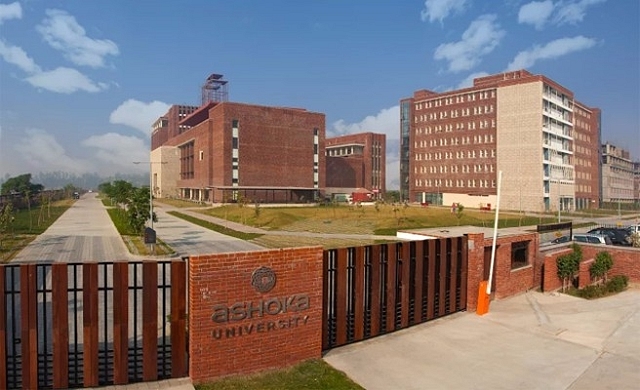
Ashoka University Row: The Left Can’t Force University Management To Toe Its Line On Kashmir
Should an institution’s name be used for something that it does not officially endorse? That is the question behind the Ashoka University row.
On 20 July, a group of left-leaning students of Ashoka University wrote a letter to all members of the university – teachers and professors, urging them to sign a petition in which they described the Indian state as an occupying force in Kashmir. In that letter they also labelled Burhan Wani’s encounter as an ‘extra-judicial killing’ and called upon everyone to speak up against the ‘atrocities’ committed by the India state.
Excerpt from the letter
A few of us, from the batch of YIF 2016, are extremely saddened with the violent unfolding of events in Kashmir post the extra-judicial execution of HM Commander Burhan Wani on the 9th of July. We believe, as ‘change agents’, which the Young India Fellows are expected to be, we need to respond to the grave historical injustice and the human right abuses the Kashmiris are met with. We strongly feel the need to condemn the violence the Indian State perpetrates as we are Young ‘India’ Fellows.
While the letter would qualify as fiction any day, the developments that have ensued deserve a serious debate.
In the petition asking for signatures, students used the university’s name without official permission. To clarify the university’s stand, the vice-chancellor sent out a polite e-mail requesting students to not use the name of the university unless acting in official capacity.
What the vice-chancellor wrote:
All major universities across the world have a “Use of Name” protocol for one simple reason: the very credibility that these students sought by adding the name of the University to the letter has been built with contributions of many batches of faculty, students and staff. All members of a University benefit when the name is well used, just as all suffer when it is not.
While the university did not stop the students from standing for what they felt was right, it urged them to not use the university’s name. Despite this request, the authors of the letter sent it forward to be published in Kafila, along with a title that suggested the university’s official approval.
Now, key questions remain: should an institution’s name be used for something that it does not officially endorse? Moreover, how should the institution respond when something of that sort happens? Should it oblige those who use the name without permission, or should it act against those to stand true to its principles? It’s clear what the answers are, but the hypocritical Indian Left fails to wrap its head around it.
While the debate was still on, two members of the university who signed the petition resigned from their posts. Following this, it was alleged that the university had fired them for signing the petition. The same was not substantiated by proof or endorsed by those affected. In any case, even if they were fired, it was within the university’s right to do so. An employee has a formal relationship with his employer, governed by the contract that is signed between the two. It is highly unlikely that Ashoka University provided its employees with the right to use the university's name in a manner and place of the employee's choice. If the permission was not granted, which is obviously the case here, the use of the university’s name was a violation of this contract.
For an institution that wishes to remain apolitical and aims to accommodate students from all social backgrounds and political standing, staying neutral on every socio-political development is the only way forward. To remain non-partisan, the university can’t side by a particular group, toe a particular ideology or pursue unsubstantiated claims.